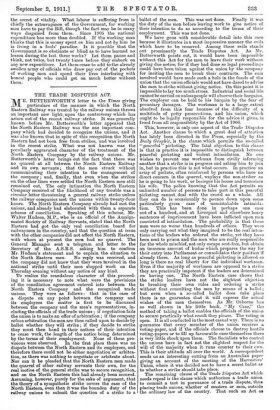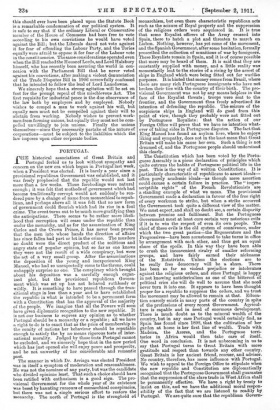THE TRADE DISPUTES ACT.
MR. BUTTERWORTH'S letter to the Times giving particulars of the manner in which the North Eastern Railway was treated by the railway unions throws an important new light‘ upon the controversy which has arisen out of the recent railway strike. It was generally known before Mr. Butterworth's letter appeared that the North Eastern Railway was the one important com- pany which had decided to recognize the unions, and it was also known that in spite of this recognition the North Eastern had not been free from strikes, and was involved in the recent strike. What was not known was the peculiarly aggravated character of the treatment of the North Eastern Company by the railway unions. Mr. Butterworth's letter brings out the fact that there was no quarrel at all between the North Eastern Railway and its own servants ; that the men struck without communicating their intention to the management of the company ; and, finally, that even when the strikes on the other lines were settled the North Eastern men still remained out. The only intimation the North Eastern Company received of the likelihood of any trouble was a circular letter threatening a general railway strike unless the railway companies met the unions within twenty-four hours. The North Eastern Company already had met the unions, and already had elaborated with them a separate scheme of conciliation. Speaking of this scheme, Mr. Walter Hudson, M.P., who is an official of the Amalga- mated Society of Railway Servants, stated that the North Eastern had got the only real conciliation board for railwaymen in the country, and that the question at issue with the other companies did not affect the North Eastern, with whom at present the men had no quarrel. The General Manager sent a telegram and letter to the Secretary of the A.S.R.S. asking him to confirm Mr. Hudson's statement and to explain the situation to the North Eastern men. No reply was received, and the company did not know that they were involved in the national strike until their men stopped work on the Thursday evening without any notice of any kind. To realize the scandalous character of this proceed- ing it is necessary to note what were the provisions of the conciliation agreement entered into between the North Eastern Company and the recognized trade unions. They were as follows : that in the case of a dispute on any point between the company and its employees the matter is first to be discussed between the company and the men's representatives, in- cluding the officials of the trade unions ; if negotiation fails the union is to make an offer of arbitration ; if the company refuse arbitration the men are then called upon to decide by ballot whether they will strike ; if they decide to strike they must then hand in their notices of their intention to cease work, the length of the notice being determined by the terms of their employment. None of these pro- visions were observed. In the first place there was no dispute between the North Eastern and its employees, and therefore there could not be either negotiation or arbitra- tion, as there was nothing to negotiate or arbitrate about. Nor can it be pleaded that the North Eastern men made the quarrel of other railway servants their own, for the real motive of the general strike was to secure recognition, and on the North Eastern this had already been secured. Assuming, however, purely for the sake of argument, that the theory of a sympathetic strike covers the case of the North Eastern, even then it was the bounden duty of the railway unions to submit the question of a strike to a ballot of the men. This was not done. Finally it was the duty of the men before leaving work to give notice of their intention to do so according to the terms of their employment. This was not done.
We have gone with considerable detail into this case because it illustrates in a most impressive manner the evils which have to be removed. Among these evils stands out prominently the Trade Disputes Act. As Mr. Butterworth points out, it would have been impossible without this Act for the men to leave their work without giving due notice, for if they had done so legal proceedings could have been taken against the union by the company for inciting the men to break their contracts. The sum involved would have made such a hole in the funds of the union that the union officials would not have dared to advise the men to strike without giving notice. On this point it is impossible to lay too much stress. Industrial and social life cannot be carried on unless people will observe their bargains. The employer can be held to his bargain by the fear of pecuniary damages. The workman is to a large extent absolved from this fear because of the difficulty of a multitude of petty prosecutions, and his union, which ought to be legally responsible for the advice it gives, is freed from all responsibility by the Act of 1906.
This, however, is only one aspect of the Trade Disputes Act. Another clause to which a, great deal of attention has lately been directed in the Press, especially by the Daily Graphic, is the clause which permits the so-called " peaceful ' picketing. The fatal objection to this clause is that in practice it is impossible to distinguish between peaceful picketing and violent intimidation. No one wishes to prevent one workman from civilly informing another that a strike is in progress and asking him to join in, but in practice this is not what occurs. In practice an army of pickets, often reinforced by persons who have no direct concern in the quarrel, waylays the non-striker as he is going to his work, or besieges his house and terrorizes his wife. The police knowing that the Act permits an unlimited number of persons to take part in this peaceful picketing cannot deal with the crowd as a whole. All they can do is occasionally to pounce down upon some particularly gross case of unmistakable intimida- tion. This has been done in perhaps one case out of a hundred, and at Liverpool and elsewhere heavy sentences of imprisonment have been inflicted upon men convicted of intimidation. The probability is that these men were no worse than hundreds of others. They were only carrying out what they imagined to be the real inten- tions of the leaders who ordered the strike, yet they have been sent to prison and the men who are really responsible for the whole mischief, not only escape scot-free, but obtain an immense amount of kudos which prepares the way for their entry into Parliament or consolidates their position if already there. As long as peaceful picketing is allowed so long is there no real liberty for the individual workman. Even if the majority of workmen are opposed to a strike they are practically impotent if the leaders are determined on having one. The North Eastern case shows that the strike leaders have not the slightest objection to breaking their own rules and ordering a strike without first consulting the men by means of a ballot; but even when a, so-called ballot does take place there is no guarantee that it will express the actual wishes of the men themselves. As Mr. Osborne has so well shown in his little book, " My Case," the method of taking a, ballot enables the officials of the union to secure practically what result they please. The voting is open. It is all conducted in the most casual way. There is no guarantee that every member of the union receives a voting-paper, and if the officials choose to destroy hostile voting-papers or to fill up favourable ones themselves there is very little check upon them. The Socialists who control the unions have in fact not the slightest respect for the will of the majority when it runs counter to their own. This is their attitude all over the world. A correspondent sends us an interesting cutting from an Australian paper giving an account of the meeting of the Harvesters' Union, where it was decided not to have a secret ballot as to whether a strike should take place. The remaining clause of the Trade Disputes Act which needs repeal is the clause which authorizes a trade union to commit a tort in pursuance of a trade dispute, thus placing trade unions, whether of masters or men, outside the ordinary law of the country. That such an Act as this should ever have been placed upon the Statute Book is a remarkable condemnation of our political system. It is safe to say that if the ordinary Liberal or Conservative member of the House of Commons had been free to vote according to his own convictions he would have voted against the Bill ; but the Liberals dared not vote against it for fear of offending the Labour Party, and the Tories equally were afraid to oppose it for fear of the Labour vote in the constituencies. The same considerations operated even when the Bill reached the House of Lords, and Lord Halsbury himself, who has recently been assuring the world in con- nexion with the Parliament Bill that he never voted against his convictions, after making a violent denunciation of the Trade Disputes Bill in 1906 sorrowfully confessed that he intended to follow the lead of Lord Lansdowne.
We sincerely hope that a strong agitation will be set on foot for the prompt repeal of this mischievous Act. The first requisite for industrial peace is the due observance of the law both by employers and by employed. Nobody wishes to compel a man to work against his will, but equally men must not be compelled against their will to abstain from working. Nobody wishes to prevent work- men from forming unions, but equally they must not be com- pelled unwillingly to join unions. Finally the unions themselves—since they necessarily partake of the nature of corporations—must be subject to the liabilities which the law imposes upon other corporate bodies.







































 Previous page
Previous page